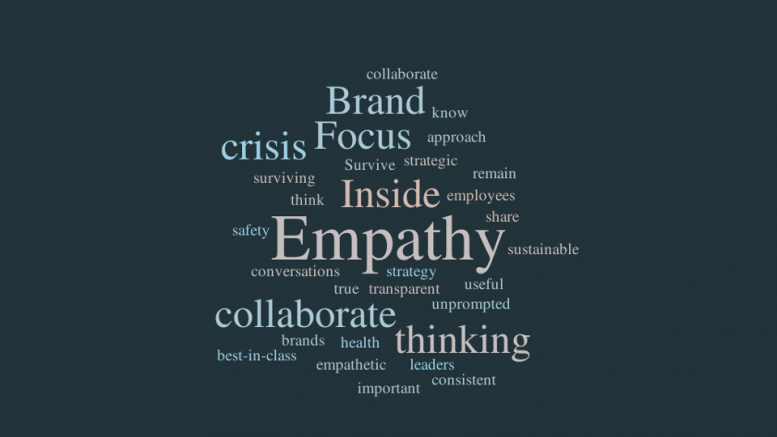When a crisis strikes is when you are tested the most both as organisations and as leaders and staying strong and resilient through the crisis and keeping the team together and doing what is right for the organisation is what counts. The mettle of a leader is in finding the balance of what is good for his people and what is the best way forward for the company and to know what is at stake.
Arrogance or humility and empathy of organisations and its leaders comes through in its communication with its people, both employees and consumers or even extended stakeholders. They say a crisis brings out the flaws and the cracks and the bad, and ugly in people, but it also brings to the fore the amazing humane sides to people and their ability to give or stand up and stand for their people.
Leadership communication and language in such times is so important to keep the team together and the brand intact from a consumer and stakeholder point of view and stand for all the value systems that a brand holds true for itself. You see so many examples of crisis communication around you, some done perfectly right, some others botched up to the level that the brand and the organisation is deeply impacted.
Always in a crisis, when preparing the strategy for resolution and communication, go back to the values that you have as an organisation outlined for the people and the brand. This always helps mould the outcome to as unique as you are as an organisation.
The language of the leader and the language of the organisation must align for the best impact, reach and effective communication. The value systems need to align too. Leadership communication is as much a reflection of the organisation as it is of the leader.
Some leaders do their own writing, they enjoy crafting their messages on their own and they bring their own inimitable style into what they write, and the soul of the organisation gets reflected in what they write too. I have had the pleasure and privilege of working with a couple of leaders who are like that. I currently work with someone who not only writes in the most articulate manner and communicates effectively, but also brings his and the organisation’s personality into what he writes and there is always an analogy or anecdote to something in his life and then a parallel drawn to what needs to be said and this always done with utmost empathy and kindness for his people and clients.
I have also worked with leaders who know what they want to say but they get help from their team to frame and articulate their messages. They are open to feedback and happy to collaborate and will work with the team to craft these and they usually lead to effective outcomes.
Then there are those others who seek no help but when you see the outcomes of these pieces of communication, you are left wondering what transpired and how something this impersonal, unaligned to brand and bordering on arrogant came to being and got circulated too… These are the ones that usually get flak for being insensitive and inwardly focused. These usually tend to reflect badly on the leadership and the organisation.
Always, seek feedback for communication pieces that need to go to a large group pf people if you are unsure. Leverage the communication and PR teams and the extended leadership to get an insight into what can be a possible outcome after you craft messages for your colleagues or clients or the world at large. Today, the speed of the internet and the ability of people to share and the anonymity that it gives you, is a sure way to be aware that your communications could go out into the world with no control measures that you can apply to it.
So always, better to be safe than sorry and to use such opportunities as a constructive exercise to build relationships and brands that will last much longer than the crisis at hand.
Every crisis is an opportunity, leverage it for the best outcomes.
The views and opinions published here belong to the author and do not necessarily reflect the views and opinions of the publisher.



Be the first to comment on "The language of leaders – Empathy and more"